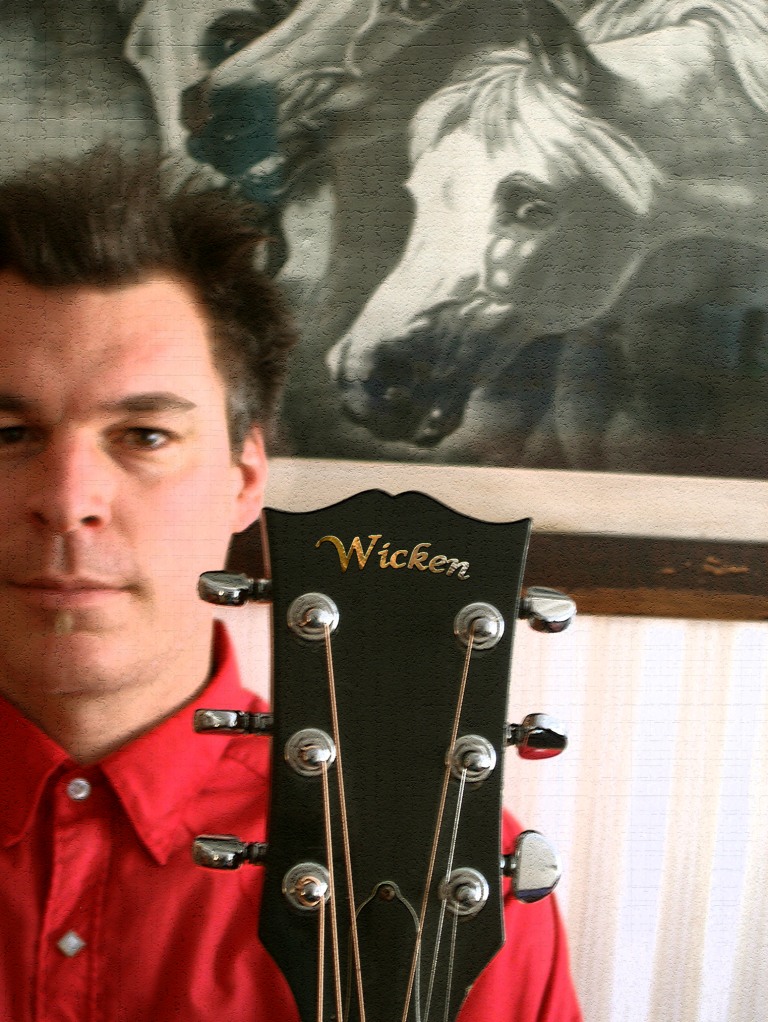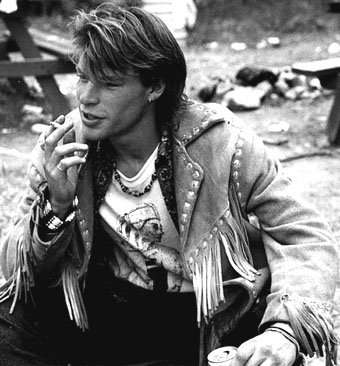Scott Wicken sees the forest for the trees
Posted on June 17, 2014 By Mike Ross Entertainment, Front Slider, Music
 It’s perfectly legal to make stuff up, but all the best songwriters seem to stick closely to the old saying “write what you know.” Who’s going to believe you otherwise?
It’s perfectly legal to make stuff up, but all the best songwriters seem to stick closely to the old saying “write what you know.” Who’s going to believe you otherwise?
For more evidence, one can’t doubt that Scott Wicken is indeed an “Old Treeplanter,” which happens to be the title of his new record, hot off whatever has replaced presses. There’s no way this is fiction. You can almost smell the forest in the music. Accompanied by an Appalachian battery of earthy goodness, he sings with a rasp between Bob Dylan and Neil Young, maybe a touch of Tom Waits: “When I was young I was a wayward son. I’m not proud of everything I ever done. Then that summer I joined a planting crew. Now I walk straight and my heart is true.”
The Foreign Legion, jail, tree planting crew, there are lots of ways to make a man out a boy. While expressing the camaraderie and lifelong bond between treeplanting brethren and sistren, the music is authentic, raw, as if hewn from the same virgin forest he and his hippie pals worked so hard and in such harsh conditions to replace after the logging companies cut it down. They lived in tents and made about a dime a tree.
Wicken only lived in Edmonton for five years during the mid 1990s – long enough to ensconce himself a weird little indie folk comedy scene since blown to flinders. He hung out at the famous Rosebowl Pizza jam and bonded with fellow bohemians like the guys in Jr. Gone Wild; Wes Borg and the late Joe Bird from Three Dead Trolls in a Baggie, who formed a band aptly named Hookahman; and other artists “living as cheaply as possible and gigging as much as possible and working as little as possible for other people,” as Wicken remembers. Most of them do the same to this day. They had their own slang for marijuana: “Hut,” which can be a verb or a noun.
Wicken is being given the full 21-hookah salute for his brief return to the Edmonton area this week. He performs with his pal Scott Cook at Wunderbar on Wednesday, June 18; at The Works Art and Design Festival stage in Churchill Square on June 19 and 23; the 19th at 6 pm at Permanent Records, run by Wicken’s pal Mike McDonald of Jr. Gone Wild; and is an emcee at the impending North Country Fair at Slave Lake June 20-22 on the longest weekend of the year for the most awesome live music bush party ever. (DIRECTIONS)
Not bad for a guy who was only here five years.
 Born and raised in rural Ontario, Wicken started out as a poet because he didn’t want to compete with his father, jazz bassist Doug Wicken. Scott says, “Although I was interested in playing music, I knew it would take me a long time to have his kind of chops and I didn’t want to do that.”
Born and raised in rural Ontario, Wicken started out as a poet because he didn’t want to compete with his father, jazz bassist Doug Wicken. Scott says, “Although I was interested in playing music, I knew it would take me a long time to have his kind of chops and I didn’t want to do that.”
In his wayward youth, a rustic upbringing collided with urban temptations.
“I lived in this converted one room schoolhouse at the edge of a field and until about grade five,” he says. “I was rural kid, and then I ended up moving to Waterloo, and I embraced a lot of urban things really quickly. I realised I’d been so isolated. I didn’t even watch television as a kid. I still don’t. But I didn’t have any urban savvy. And so I embraced urban life through my teenage years wholeheartedly, and became really interested in pursuing music. I embraced punk rock absolutely when it came along, because that was my era. So I became very, very urban – including all the bad habits of being urban.”
By 1989, he wound up living with a “bunch of junkies” in Vancouver, practically a junkie himself. Then he met a clean-living modern dancer, hauled ass to Yellowknife and soon joined the elite ranks of the treeplanters.
“When I went tree planting, it reacquainted me with the natural world,” Wicken says. “And I realised at that point there were much bigger, more important relationships to build than the kind of urban relationships I was building. I don’t want to break it down between rural and urban, but I decided to start living again. It was through tree planting, which is a lot of hard, repetitive work, and I was isolated from the people I knew and the bad habits, that allowed me to look at what I was doing and reassess ways of thinking and patterns I had. I was part of a troupe of people who were all going through this weird change. A lot of people were creative. A lot of people played music.”
Wicken didn’t plan to wind up in Edmonton. He’d been working with a crew at a badly-run camp in Northern Alberta, where the soil is hard, and where the drinking water was tainted with diesel fuel, among other nasty conditions. He and a woman he was having an affair with quit and “I sort of ended up in Edmonton by mistake.” That seems to happen a lot.
Wicken moved back to Kitchener-Waterloo 17 years ago and has been making music and poetry ever since.
Like many of the best songwriters, this 47-year-old former treeplanter maintains a recording career out of love more than the hope of money. He won’t be quitting his day job as a waiter in a fine dining restaurant. Although he can now play more than a dozen instruments, unconcerned with matching dad’s “chops,” he still does spoken word pieces. His words are darker than ever: “At my autopsy, the doctor will take my heart from my chest … He will wonder aloud how such a bruised and battered thing could have kept beating for so long … At a dinner party of his peers, he’ll hold it aloft and intone, ‘here, friends, is the shrunken, scarred heart of a sucker. May none of us ever be so afflicted!’” And so on. Other songs on Old Treeplanter deal with doomed romance, mortality and plenty of soul-searching. Write what you know. On success in music, however the artist defines it, perseverance is the key, Wicken says.
“There’s a saying in the business,” he says. “The big reward, whatever that is, wherever this thing goes, is granted to the last person standing.”











